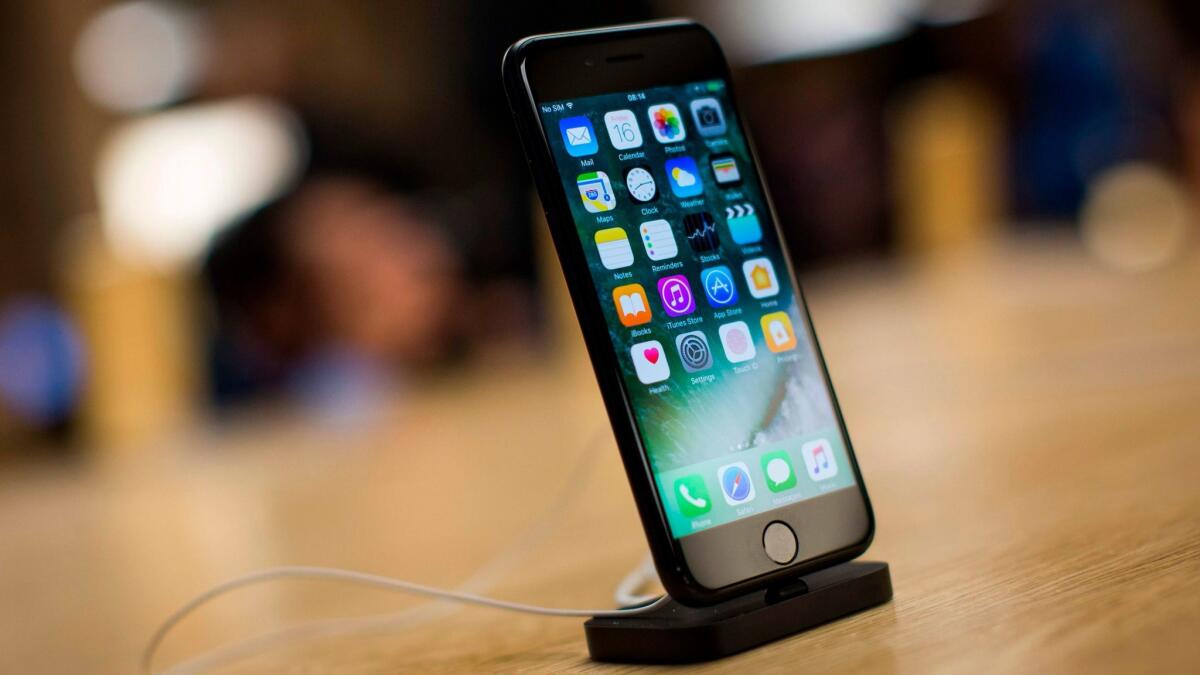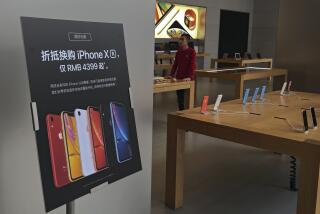U.S. is investigating Apple over slowed-down iPhones, sources say

- Share via
The Justice Department and the Securities and Exchange Commission are investigating whether Apple Inc. violated securities laws concerning its disclosures about a software update that slowed older iPhone models, according to people familiar with the matter.
The government has requested information from the company, according to the people, who asked not to be named because the investigation is private. The inquiry is in early stages, they cautioned, and it’s too soon to conclude any enforcement will follow. Investigators are looking into public statements made by Apple on the situation, they added.
While the slowdown has frustrated consumers, U.S. investigators are concerned that the company may have misled investors about the performance of older phones.
A spokesman for the SEC declined to comment. An Apple spokeswoman didn’t immediately respond to a request for comment.
Apple shares fell 0.6% on Tuesday to close at $166.97. Apple stock also has been under pressure because of concern about weaker-than-expected iPhone X sales. The company is slated to issue its earnings report Thursday.
Several weeks ago, the Cupertino, Calif., tech giant said a software update it released in early 2017 slowed down the performance of some older iPhone models as a way to prevent the phones from shutting down at random. When it released the update, the company hadn’t said the software would slow down the devices. Apple apologized in December for not clearly communicating this information and vowed to release another update to mitigate the concern.
This month, Apple Chief Executive Tim Cook told ABC News that when the company put out the software update that caused the performance issues for older iPhones, “we did say what it was, but I don’t think a lot of people were paying attention. And maybe we should have been clearer.”
The slowdowns occur when the iPhone’s battery reaches a certain, unspecified point of low health, and the problem can be fixed if a user replaces the old battery with a new one. As part of its public apology, Apple cut the prices of battery replacements in its stores to $29 — a $50 discount. The discount applies only to certain models, and only to phones “whose battery needs to be replaced.”
Apple plans to release an iPhone software update, called iOS 11.3, in the spring with new features that enable users to monitor the health of their phone’s battery and protect against slowdowns. If consumers turn off the throttling, older iPhones will be more prone to randomly rebooting, Apple has said. The system affects iPhone 7 models and older, but not the iPhone 8 and iPhone X, according to the company.
After admitting in December to the slowing, Apple was sued by consumer advocacy groups and individual iPhone users in a global backlash. U.S. government officials, including Sen. John Thune (R-S.D.), have also questioned Apple about the slowdowns.
The situation is a self-inflicted black eye on the company, which also has been wrestling with some other software-related issues. Those include processor vulnerabilities that have affected other technology companies and a login flaw that allows intruders to access files on Mac computers without a passcode.
Also, Apple is delaying some key iPhone and Mac software features planned for release this year to focus on quality improvements.
UPDATES:
4:50 p.m.: This article was updated with details about what investigators are said to be looking into, with comment from Apple CEO Tim Cook and with Apple shares’ closing price.
This article was originally published at 11:25 a.m.






